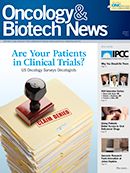Oncotype DX Independent Predictor of Stage II Colon Cancer
At the 2010 Gastrointestinal Cancers Symposium, researchers from two studies reported that the Oncotype DX colon cancer test, combined with extended lymph node assessment,helped identify patients at high risk of recurrence for stage II colorectal cancer after surgery.
Click here to view as PDF.
At the 2010 Gastrointestinal Cancers Symposium, researchers from two studies reported that the Oncotype DX colon cancer test, combined with extended lymph node assessment, helped identify patients at high risk of recurrence for stage II colorectal cancer after surgery. Investigators said this information could help guide treatment decisions. Adjuvant chemotherapy is presently not recommended for patients with stage II colon cancer, though physicians may consider it an option for patients who have a higher risk of recurrence.
The QUASAR (Quick and Simple and Reliable) validation study looked at trial data for 657 patients who underwent resection for stage II colorectal cancer. Records showed patients had a median number of 10 nodes examined for disease. For 19% of the patients, <6 nodes were examined, and for 37%, ≥12 nodes were looked at. Patients with <8 nodes examined were more likely to have recurrence (hazard ratio [HR], 1.77; P <.001) compared with patients who had ≥12 nodes examined (HR, 1.38; P = .065). Based on the data, investigators reported that patients who had surgery more recently were likely to have a greater number of nodes examined compared with patients whose surgery occurred in the more distant past.
Next, they looked at recurrence score obtained using the 12-gene Oncotype DX assay. Richard Gray, PhD, University of Birmingham, England, and colleagues, developed a model incorporating the recurrence score and the 12-node examination. They found that both independently predicted risk of recurrence (P = .01 for the assay and P = .05 for the node examination). Models using microsatellite instability and T stage produced similar results.
Examining ≥12 nodes suggested a 3% to 7% reduced risk of recurrence compared with examining fewer nodes in patients with the same recurrence score. A 5% absolute decrease in the 3-year recurrence risk was consistent across the full range of recurrence scores when ≥12 nodes were examined. The authors said both parameters should be used to assess risk of recurrence after surgical resection of stage II disease.
The other study looked at whether the Oncotype DX 12-gene assay could be used to distinguish stage II from stage III colon cancer. Researchers looked at recurrence scores for 634 patients with stage II colon cancer and 844 with stage III colon cancer, as well as pathologic markers and gene expression for 375 genes. They found only minor genetic differences between stage II and stage III disease. Of the total genes considered, only 5 showed significantly different expression in stage II versus stage III colon cancer (P <.05). Stage II colon cancer, researchers said, was more likely to have mucinous histology (P = .007) and be mismatch repair-deficient (P = .04), which offered prognostic value in stage II disease.
The 18-gene Oncotype DX colon cancer assay, marketed by Genomic Health, uses similar technology to its 27-gene Oncotype DX breast cancer test. The colon cancer test recently became available commercially.
O’Connell MJ, Lavery IC, Gray RG, et al. Comparison of molecular and pathologic features of stage II and stage III colon cancer in four large studies conducted for development of the 12-gene colon cancer recurrence score. Abstract 280. Presented at: 2010 Gastrointestinal Cancers Symposium. January 22-24, 2010; Orlando, FL.
Gray RG, Quirke P, Handley K, et al. Correlation of number of nodes examined and the 12-gene colon cancer recurrence score with recurrence in stage II colon cancer patients from QUASAR. Abstract 331. Presented at: 2010 Gastrointestinal Cancers Symposium. January 22-24, 2010; Orlando, FL.




